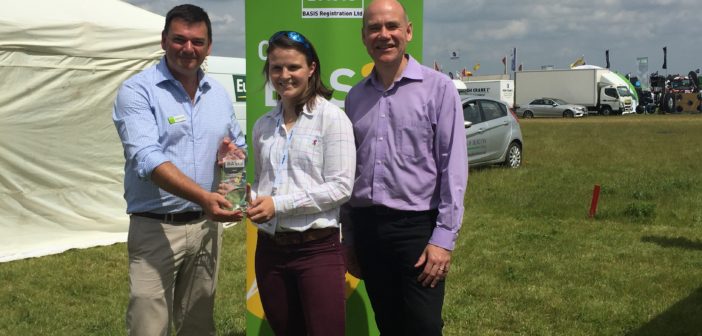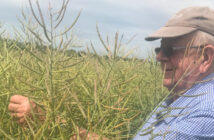The much-anticipated award winner for the BASIS ‘Paul Singleton Project of the Year Award’ is announced as Rosalind Martin, for a cover crop project, which could aid integrated weed management strategies on arable farms.
The winning project investigates how cover crop ‘debris’ affects pre-emergence herbicide efficacy and wheat crop emergence.
“In recent years, there has been a surge in interest in the use of cover crops and direct drilling establishment techniques,” says Rosalind Martin, award winner, and Bayer commercial technical advisor for the North West. “However, when cover crops are sprayed off and winter wheat is direct drilled, the cover crop debris remains on the ground. It is then unknown how this may impact crop emergence and the efficacy of pre-emergence herbicides.”
Rosalind was inspired to conduct the project when she visited David White, a self-proclaimed ‘Dog and Spade Farmer’, local to Cambridge, during her training at Bayer.
Rosalind’s project was conducted in 2015 on David’s farm, on a medium-pressure blackgrass site, and included a robust herbicide programme as well as several cultural control measures, such as delayed drilling.
“The trial compared two plots, one where the cover crop debris was removed by hand and one where the debris was left in its natural state. The results showed that there was no difference between the two sites, in terms of weed and crop emergence,” says Rosalind.
“The conclusion is that this style of integrated weed management can give good control of medium pressure blackgrass, and also indicated that debris doesn’t affect crop emergence. Further work will need to be carried out in order to establish the effect of cover crop debris on pre emergence herbicide efficacy. However, initial research, conversations with growers and a literature review suggest that they may not affect their efficacy.”
Rosalind is delighted with the win, which has been judged against the top five projects which are a fundamental element of the ‘Certificate in Crop Protection’ training from BASIS. “It’s a real honour to win. The course was really enjoyable as it was so relevant to my job and has benefitted me hugely, in terms of knowledge and career development. I’d recommend it to anyone interested in agronomy and I hope that my research can be of value to our UK farmers,” adds Rosalind.
Stephen Jacob, BASIS’ chief executive officer, is pleased to announce who he feels is a deserving winner. “We had some fantastic projects through this year. But this one stood out to the panel of BASIS exam chairmen, due to the level of practical and technical understanding, and benefit to the industry. We’re pleased to hand it to a worthy winner,” concludes Stephen.




